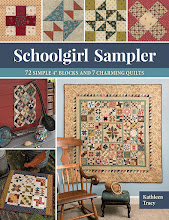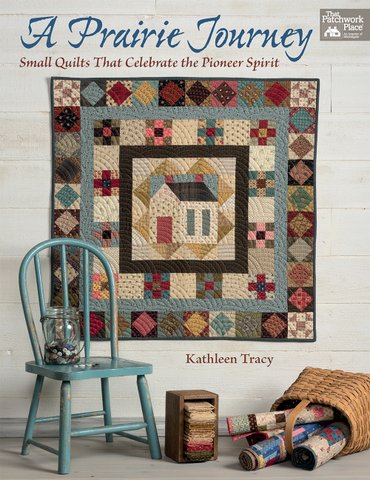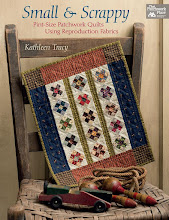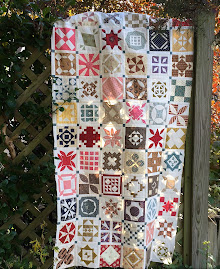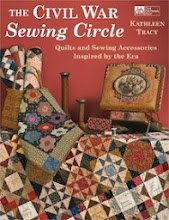For the past few months I've been hand quilting some quilts for my next book, due out next year. I know I blog about hand quilting again and again so forgive me for repeating myself. Some of you have heard this before but I like to encourage others to try hand quilting because it can be so satisfying and fun as well. AND - this week I'm holding a giveaway for some fun stencils for quilting your small quilts to make it even easier for you.
NOTE: This giveaway has now ENDED.
The Stencil Company has generously offered to let me give away a couple of their small stencils to six lucky quilters. Woo hoo! To win a set of stencils, leave me a comment. Include your e-mail, link to your profile with an e-mail or another way for me to reach you so I can let you know you've won. If you do not leave your e-mail in your comment or profile then I will have to pass over your comment and go on to the next one. This happens quite a bit when I hold giveaways, sorry to say. I will pick six winners at random and announce them on Friday, August 11. Good luck!
NOTE: This giveaway has now ENDED.
Little quilts are perfect for practicing your hand quilting. I think it really adds something to these small projects and I always like to do my part to encourage quilters to try it. Even if the first one you try isn't all that good, keep at it and you'll get better. When I've been away from it for awhile and then pick it up again those first few lines of stitching are a little less straight than I'd prefer. But it comes back quickly and you pick up a certain rhythm if you do it long enough and get in the "zone." Straight-line quilting is often easy enough for beginners and if that doesn't quite do it for you, you can always try a quilting stencil to add a little more pizzazz to your quilt.
Quilting stencils are easy to use with a water soluble marking pen or another type of fabric marker. Your local quilt shop probably carries stencils in different sizes along with marking tools. You can often find stencils at booths when you shop at the larger quilt shows. You can also find them online. The Stencil Company sells a nice variety of stencils for small quilt blocks and borders and they have a whole page dedicated to my followers - Sentimental Quilter - on their website.
This little wavy stencil is one of my favorites and I like to use it often. Simple, but a little bit special without overpowering the border.
I don't ever plan on winning any prizes for my hand quilting. I'm not afraid to admit that I still enjoy making things even if I'm not perfect at them. If I waited until I did things perfectly I'd never make anything! A friend of mine said she thought all hand quilting was always supposed to be done free hand and so she was hesitant to try it because she had no skills and was afraid she'd never get her lines straight.
Goodness, if this is what's keeping you from trying it, please take advantage of tools that make quilting easier. There's a product called Tiger Tape that helps you learn to space your stitches evenly if you're just beginning. You line up the tape along the place you want to stitch and then follow the markings on the tape to keep your stitches in line. If it helps you stitch straighter lines, why not use it? There's no rule that says quilting has to be done a certain way except among the purists or if you're entering your quilt in a show. Then, of course, it matters and it should be perfect. But, if you're just beginning and hesitant to try for this reason - remember, in the 19th century, some wonderful antique quilts were hand quilted. If you take a close look, you'll see that not all of them were necessarily quilted with exceptional skill. Even the average quilter hand quilted her quilts. We all have to begin somewhere and the point is to enjoy the process. You get better with practice.
If you do become inspired to try hand quilting, you can try several different pens or pencils to mark your stitching lines. There are Sewline colored lead pens or pencils. I've tried a chalk marker but found it erased too easily and I couldn't see the lines. Some like Frixion pens. After trying several different products, I prefer to use a use a fine-point washable quilt marking pen and have found several made by the Clover company that work well and wash out nicely. I use a Clover blue water-soluble marking pen on lighter fabrics and a Clover white pen for marking my darker fabrics. Despite my preferences, some of these other pens may be good options for you so try a few of them and see. You need to find what works best for YOU.
Here's a tip: Whichever marking tool you try, follow the directions on the package. If you decide to use a washable marker, after you finish quilting, do not press or place your quilt in the dryer until you are sure that all of the markings have been washed out. I have almost ruined a quilt by not being careful. Depending upon the pen, some markings will be set with HEAT and won't come out easily. (The Frixion pen markings apparently disappear with heat and reappear when cold so again, check the directions.) Just take your time, put on your glasses so you can see the lines (that's a reminder to myself!) and gently wash the top of the quilt with a damp cloth until all of the markings are off. Then, let it air dry. If you can still see some marks, wash it again.
If you believe that hand quilting is really too difficult even before you begin, all I can say is try it before you decide it's not for you. It really doesn't have to be perfect - you will get better with practice. Or, maybe, like me, you'll find that it won't matter if your stitches aren't exactly perfect. My intentions are always good, but sometimes quirky, childlike stitches suit me and my quilt just fine.
Border stencils that measure 2 or 2.5 inches are perfect for quilting the borders of many of my small quilts and these are some of the ones I'll be giving away.
You can also find stencils in many different sizes that match the size of your blocks.
Go ahead - mark the lines with your preferred marking tool. It washes out!
Then, stitch on the lines with a nice glazed cotton quilting thread. I prefer the YLI brand in light brown since it is not as stark as white thread against medium and dark fabrics. It's really more of a tan and goes well with 1800s reproduction fabrics.
Follow the directions on the pen or pencil to erase or wash off the markings. I always play it safe and use cold water instead of hot when I wash mine.
I am clearly not an expert and my stitches could be a little smaller and straighter for sure but it's still so much fun to sit and stitch and see what the quilting adds to finishing a quilt. It doesn't have to be heavily quilted - straight lines or Xs are perfectly fine and good for practicing. Even a little bit of hand quilting will give a special look to your small, simple quilt. And, don't forget, if you make a mistake or find that your stitches are quirky or a little less than perfect - oh well, try not to worry too much. Antique doll quilts were not perfect either. We're just having fun here.
Leave me a comment about quilting or making small quilts and I will pick six winners and announce the names on Friday, August 11. Good luck! (And please read the directions!)
* * *
P.S. - It has come to my attention that some of you who signed up to follow my blog through e-mail to keep up when there are new blog posts have not activated your e-mail delivery account. When you signed up, you should have received a verification or activation e-mail afterwards. If you did not send a reply to verify your e-mail, it won't work and you will not receive updates. You may have to try again. The follow by e-mail button is on the blog sidebar.



























































